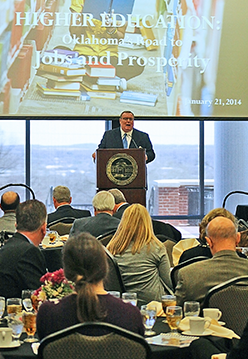
Chancellor Glen D. Johnson presented the Oklahoma State Regents for Higher Education’s FY 2015 legislative agenda to an audience of lawmakers, community leaders and educators at Rogers State University’s Centennial Center Ballroom.
With the demand for employees who have certificates and degrees continually increasing, college completion remains the top priority in the state of Oklahoma. That was the message delivered Tuesday by Chancellor Glen D. Johnson as he presented the Oklahoma State Regents for Higher Education’s FY 2015 legislative agenda to an audience of lawmakers, community leaders and educators at Rogers State University’s Centennial Center Ballroom.
The Oklahoma State Regents for Higher Education recently voted to request $76.3 million in new state appropriations during the upcoming legislative session. The total budget request for FY 2015 is 7.7 percent higher than the current year’s appropriation.
“Oklahoma’s system of higher education is the state’s road to jobs and prosperity,” Johnson said. “No entity in state government can help Oklahoma reach its goals of educational excellence and workforce development faster or more comprehensively than public higher education. Our budget request would support our institutions’ ongoing commitment to produce more college graduates, which increases our state’s per capita income and strengthens our state’s economy.”
The State Regents are requesting $55.1 million for Complete College America performance-funding needs. This investment will provide state colleges and universities funding for additional course sections, full-time faculty and financial aid. These dollars will also fund information technology equipment, library resources and other operational needs that will provide continued support for student success.
The State Regents are also seeking $2.5 million for online education and degree completion technology. This will enable students to enroll in additional course sections and will provide for improved software development and training.
The State Regents are requesting $10 million to fund a competitive grant program that will enhance higher education institutions’ efforts to expand specialized student services, including focused advisement, career counseling and job placement, veterans’ programs, and financial education.
Increased financial aid funding will also be a priority for the State Regents in the upcoming legislative session. The State Regents seek to increase funding for the concurrent enrollment program, which allows high school juniors and seniors to take credit-earning college courses, by $3 million, and are requesting $1.5 million for the Oklahoma Tuition Aid and Oklahoma Tuition Equalization grants and $250,000 for an adult degree completion community scholarship match.
The State Regents are also requesting an additional $250,000 for the Summer Academies program, which provides interactive learning opportunities for Oklahoma eighth- through 10th-grade students in high-demand science, technology, engineering and mathematics (STEM) disciplines.
The total appropriation request for FY 2015 is $1.06 billion.
RSU President Dr. Larry Rice co-hosted Tuesday’s appearance in Claremore along with Northeastern State University President Dr. Steve Turner and Northeastern Oklahoma A&M College President Dr. Jeffery Hale.
“We stand together today in support of higher education in Oklahoma,” said RSU President Dr. Larry Rice. “It is no secret these have been some challenging years for state-supported agencies, such as higher education. We have seen state support for higher education dwindle, while students are being required to carry an ever-increasing burden for the cost of their education. The state’s economic vitality and future depend heavily on our ability to graduate men and women prepared to make a difference in the workforce and in their communities.”
